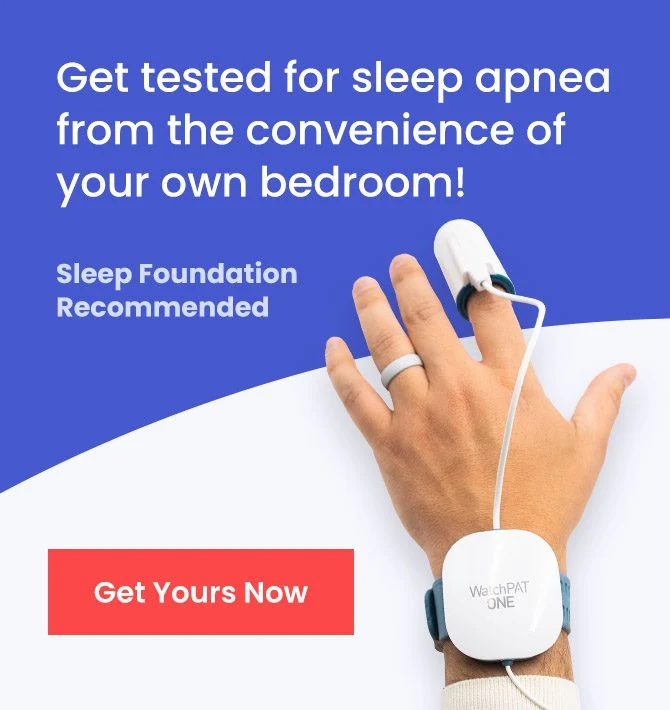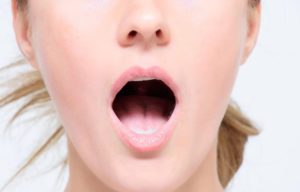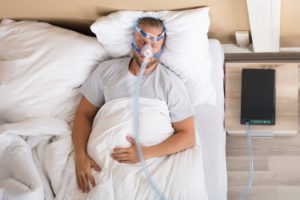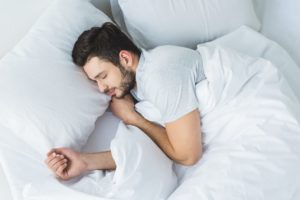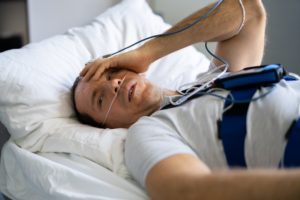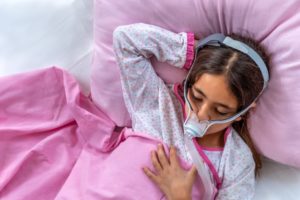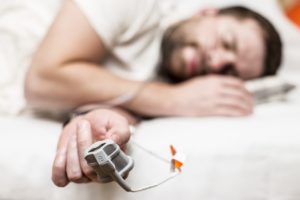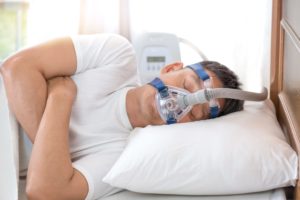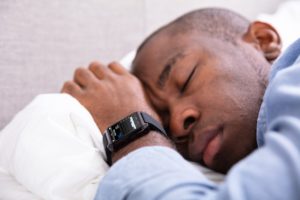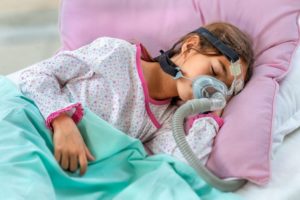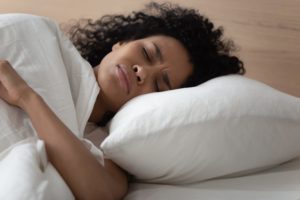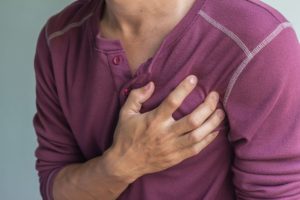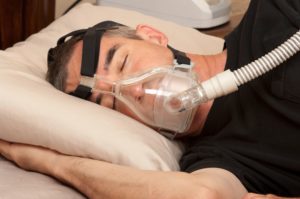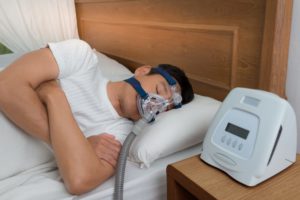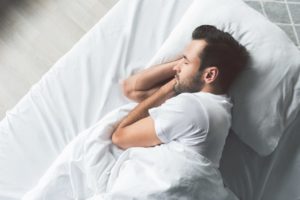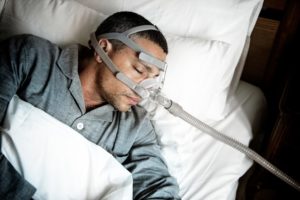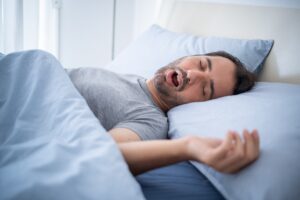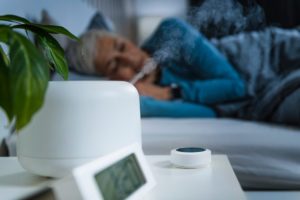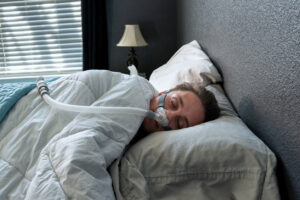When you buy through our links, we may earn a commission. Products or services may be offered by an affiliated entity. Learn more.
How Weight Affects Sleep Apnea
Sleep apnea is a relatively common disorder in which people experience disrupted breathing while they are sleeping. In obstructive sleep apnea (OSA), the most common type of sleep apnea, disruptive breathing occurs because of a narrow or blocked upper airway. It’s similar to breathing through a straw. Those with severe OSA may have upwards of 30 breathing disruptions per night.
As the medical community learns more about sleep apnea, several important links to excess body weight are emerging. Not only can excess weight cause sleep apnea, but it can worsen the symptoms and exacerbate its detrimental health effects. Insufficient sleep may also lead to weight gain, making it a vicious cycle. Encouragingly, many studies show that weight loss improves sleep apnea. If you are struggling with sleep apnea or obesity, it’s important to understand the complex interactions between the two conditions.
Why Excess Weight Causes Sleep Apnea
Several health conditions increase the likelihood of developing sleep apnea, but OSA is most common in people who are overweight or obese. Excess weight creates fat deposits in a person’s neck called pharyngeal fat. Pharyngeal fat can block a person’s upper airway during sleep when the airway is already relaxed. This is why snoring is one of the most common sleep apnea symptoms — air is literally being squeezed through a restricted airway, causing a loud noise.
Additionally, increased abdominal girth from excess fat can compress a person’s chest wall, decreasing lung volume. This reduced lung capacity diminishes airflow , making the upper airway more likely to collapse during sleep. OSA risk continues to increase with a rising body mass index (BMI), which measures one’s body fat based on height and weight. Even a 10% weight gain is associated with a six-fold increase in OSA risk.
Less common causes of sleep apnea include enlarged tonsils that block the airway, anatomical features such as a large neck or narrow throat, endocrine disorders (including diabetes and thyroid disease), acid reflux, lung diseases, and heart problems. However, roughly 60–90% of adults with OSA are overweight.
Take Our Quiz to Know Your Sleep Apnea Risk
To understand if you could have sleep apnea, take our short quiz below to see if you exhibit any signs.
Can Sleep Apnea Cause Weight Gain?
While excess weight has long been known to be a risk factor for OSA, an increasing amount of evidence suggests the relationship is reciprocal. This is because sleep deprivation is associated with decreased leptin (an appetite-suppressing hormone) and increased ghrelin (an appetite-stimulating hormone), which may increase cravings for calorie-dense foods. Additional data indicates that insufficient sleep leads to overeating, obesity, and a decrease in fat-loss during calorie restriction.
It also appears that OSA patients, in particular, may be more susceptible to weight gain than people who have the same BMI and health status but do not suffer from sleep apnea. This is illustrated in one study that showed people with OSA gained significantly more weight (around 16 pounds ) in the year leading up to their OSA diagnosis compared with BMI-matched people without OSA.
Sleep apnea can also deplete people of the energy they need to maintain a healthy body weight. Daytime sleepiness is a common sleep apnea symptom, resulting from fragmented, unrefreshing sleep. Excessive sleepiness may lead sleep apnea sufferers to exert less physical activity during waking hours. This may be particularly problematic for obese people, who frequently experience more shortness of breath and chest discomfort with physical effort, resulting in limited exercise. Without dietary changes, decreased activity levels can lead to additional weight gain.
Health Risks of Sleep Apnea and Excess Weight
Deprived of sufficient, quality rest, sleep apnea sufferers experience significant stress on their cardiovascular, metabolic, and pulmonary systems. This may be particularly worrisome for obese people, because obesity can also elevate the risk of heart, lung, and metabolic problems , potentially compounding their health concerns.
Sleep Apnea and Cardiovascular Health
Sleep apnea affects a person’s entire cardiovascular system in several ways. Each time a breathing lapse occurs, the body’s oxygen supply drops, triggering a “fight or flight” response. When this response occurs, blood pressure surges and heart rate increases, causing the sleeper to awaken and reopen their airway. This cycle repeats throughout the night. The cyclic rising and falling blood oxygen levels can cause inflammation, which in turn may lead to atherosclerosis (a build-up of plaque in the blood vessels) which is associated with heart attacks, stroke, and high blood pressure.
Sleep apnea also elevates carbon dioxide and glucose levels in the blood, disrupts the part of the nervous system that controls heartbeat and blood flow, increases insulin resistance, and alters the flow of oxygen and carbon dioxide. As a result, sleep apnea is associated with the following heart, lung, and metabolic problems, among others:
- Hypertension (high blood pressure)
- Atrial fibrillation and other arrhythmias
- Heart failure
- Stroke and transient ischemic attacks (TIAs, also known as “mini-strokes”)
- Coronary heart disease
- Type 2 diabetes
- Metabolic syndrome (obesity, hypertension, diabetes, and dyslipidemia)
Obesity Hypoventilation Syndrome and Sleep Apnea
OSA frequently coexists in people with obesity hypoventilation syndrome (OHS). In OHS, excess weight puts pressure against a person’s chest wall, compressing their lungs, and therefore interfering with their ability to take deep, well-paced breaths. Up to 90% of people with OHS also have sleep apnea, but not everyone with OSA has OHS. The risk of OHS is correlated to BMI, with prevalence rising to almost 50% in those whose BMI is greater than 50 .
Like sleep apnea, OHS can cause high blood pressure and heart failure, and it can decrease oxygen while elevating carbon dioxide levels in the blood. Patients afflicted with both of these conditions have a significant risk of cardiovascular disease. Unfortunately, OSA patients with severe OHS have an increased risk of death.
Can Losing Weight Cure Sleep Apnea?
Treating sleep apnea, like treating many diseases, starts with lifestyle and behavioral modifications. For most OSA sufferers, this includes working toward a healthy body weight. Weight loss reduces fatty deposits in the neck and tongue which can contribute to restricted airflow. This also reduces abdominal fat, which in turn increases lung volume and improves airway traction, making the airway less likely to collapse during sleep.
Losing weight can also significantly reduce many OSA related symptoms, such as daytime sleepiness. Irritability and other neuropsychiatric dysfunctions markedly improve as well. There is an overall improvement in cardiovascular health, high blood pressure, insulin resistance, type 2 diabetes , and in particular quality of life. Weight loss of just 10-15% can reduce the severity of OSA by 50% in moderately obese patients. Unfortunately, while weight loss can provide meaningful improvements in OSA, it usually does not lead to a complete cure, and many sleep apnea patients need additional therapies.
Does the Weight Loss Method Matter?
With several options for losing weight, many OSA patients want to know which one is best for sleep apnea. Some of the best weight loss methods include:
- Dietary changes
- Increased physical activity
- Medications
- Surgery
There is evidence that behavioral modification is just as effective as certain weight-loss surgeries in improving OSA. Encouragingly, exercise alone can modestly improve the severity of OSA, even without significant weight loss.
Regardless of technique, OSA improvement is proportional to the amount of weight lost. Therefore, patients should discuss with their doctor which weight loss strategy is best-suited to their personal circumstances, overall health, and their OSA severity.
Will Treating Sleep Apnea Help You Lose Weight?
Evidence suggests that OSA patients who effectively manage their sleep apnea may find it easier to lose weight. In one study, ghrelin (a hormone that stimulates appetite) levels were higher in OSA patients than in people without OSA of the same body mass but fell to comparable levels after two days of using CPAP treatment.
Conflictingly, long-term use of CPAP, the most effective sleep apnea treatment, has been associated with weight gain in some studies . However, the reasons for this association are unclear, and more research is needed. Given the complexity of weight and sleep apnea treatment, overweight patients should not solely rely on CPAP therapy or apnea treatments as their sole means of weight control.
Don’t Wait To Seek Care
When it comes to sleep and weight, early intervention is key for preventing harm and reclaiming quality of life. With adequate treatment, sleep apnea carries an excellent prognosis. And it’s never too late, or too early, to take an active approach to weight control. If you think you may have sleep apnea, it’s important to see a doctor for an accurate diagnosis and tailored treatment options.
References
16 Sources
-
Schwartz, A. R., Patil, S. P., Laffan, A. M., Polotsky, V., Schneider, H., & Smith, P. L. (2008). Obesity and obstructive sleep apnea: pathogenic mechanisms and therapeutic approaches. Proceedings of the American Thoracic Society, 5(2), 185–192.
https://pubmed.ncbi.nlm.nih.gov/18250211/ -
Young, T., Skatrud, J., & Peppard, P. E. (2004). Risk factors for obstructive sleep apnea in adults. JAMA, 291(16), 2013–2016.
http://jama.jamanetwork.com/article.aspx?doi=10.1001/jama.291.16.2013 -
Peppard, P. E., Young, T., Palta, M., Dempsey, J., & Skatrud, J. (2000). Longitudinal study of moderate weight change and sleep-disordered breathing. JAMA, 284(23), 3015–3021.
http://jama.jamanetwork.com/article.aspx?doi=10.1001/jama.284.23.3015 -
Pillar, G., & Shehadeh, N. (2008). Abdominal fat and sleep apnea: the chicken or the egg?. Diabetes care, 31 Suppl 2(7), S303–S309.
https://diabetesjournals.org/care/article/31/Supplement_2/S303/24789/Abdominal-Fat-and-Sleep-ApneaThe-chicken-or-the -
Nedeltcheva, A. V., Kilkus, J. M., Imperial, J., Schoeller, D. A., & Penev, P. D. (2010). Insufficient sleep undermines dietary efforts to reduce adiposity. Annals of internal medicine, 153(7), 435–441.
http://annals.org/article.aspx?doi=10.7326/0003-4819-153-7-201010050-00006 -
Jean-Louis, G., Zizi, F., Clark, L. T., Brown, C. D., & McFarlane, S. I. (2008). Obstructive sleep apnea and cardiovascular disease: role of the metabolic syndrome and its components. Journal of clinical sleep medicine : JCSM : official publication of the American Academy of Sleep Medicine, 4(3), 261–272.
https://www.ncbi.nlm.nih.gov/pmc/articles/PMC2546461/ -
Obesity Hypoventilation Syndrome. (n.d.).
https://www.nhlbi.nih.gov/health-topics/obesity-hypoventilation-syndrome -
Masa, J. F., Corral, J., Alonso, M. L., Ordax, E., Troncoso, M. F., Gonzalez, M., Lopez-Martínez, S., Marin, J. M., Marti, S., Díaz-Cambriles, T., Chiner, E., Aizpuru, F., Egea, C., & Spanish Sleep Network (2015). Efficacy of Different Treatment Alternatives for Obesity Hypoventilation Syndrome. Pickwick Study. American journal of respiratory and critical care medicine, 192(1), 86–95.
https://www.atsjournals.org/doi/10.1164/rccm.201410-1900OC -
Macavei, V. M., Spurling, K. J., Loft, J., & Makker, H. K. (2013). Diagnostic predictors of obesity-hypoventilation syndrome in patients suspected of having sleep disordered breathing. Journal of clinical sleep medicine : JCSM : official publication of the American Academy of Sleep Medicine, 9(9), 879–884.
https://pubmed.ncbi.nlm.nih.gov/23997700/ -
Castro-Añón, O., Pérez de Llano, L. A., De la Fuente Sánchez, S., Golpe, R., Méndez Marote, L., Castro-Castro, J., & González Quintela, A. (2015). Obesity-hypoventilation syndrome: increased risk of death over sleep apnea syndrome. PloS one, 10(2), e0117808.
https://pubmed.ncbi.nlm.nih.gov/25671545/ -
Wang, S. H., Keenan, B. T., Wiemken, A., Zang, Y., Staley, B., Sarwer, D. B., Torigian, D. A., Williams, N., Pack, A. I., & Schwab, R. J. (2020). Effect of Weight Loss on Upper Airway Anatomy and the Apnea-Hypopnea Index. The Importance of Tongue Fat. American journal of respiratory and critical care medicine, 201(6), 718–727.
https://pubmed.ncbi.nlm.nih.gov/31918559/ -
Reutrakul, S., & Mokhlesi, B. (2017). Obstructive Sleep Apnea and Diabetes: A State of the Art Review. Chest, 152(5), 1070–1086.
https://pubmed.ncbi.nlm.nih.gov/28527878/ -
Dixon, J. B., Schachter, L. M., O’Brien, P. E., Jones, K., Grima, M., Lambert, G., Brown, W., Bailey, M., & Naughton, M. T. (2012). Surgical vs conventional therapy for weight loss treatment of obstructive sleep apnea: a randomized controlled trial. JAMA, 308(11), 1142–1149.
http://jama.jamanetwork.com/article.aspx?doi=10.1001/2012.jama.11580 -
Iftikhar, I. H., Kline, C. E., & Youngstedt, S. D. (2014). Effects of exercise training on sleep apnea: a meta-analysis. Lung, 192(1), 175–184.
https://pubmed.ncbi.nlm.nih.gov/24077936/ -
Harsch, I. A., Konturek, P. C., Koebnick, C., Kuehnlein, P. P., Fuchs, F. S., Pour Schahin, S., Wiest, G. H., Hahn, E. G., Lohmann, T., & Ficker, J. H. (2003). Leptin and ghrelin levels in patients with obstructive sleep apnoea: effect of CPAP treatment. The European respiratory journal, 22(2), 251–257.
http://erj.ersjournals.com/cgi/doi/10.1183/09031936.03.00010103 -
Drager, L. F., Brunoni, A. R., Jenner, R., Lorenzi-Filho, G., Benseñor, I. M., & Lotufo, P. A. (2015). Effects of CPAP on body weight in patients with obstructive sleep apnoea: a meta-analysis of randomised trials. Thorax, 70(3), 258–264.
https://thorax.bmj.com/lookup/doi/10.1136/thoraxjnl-2014-205361



